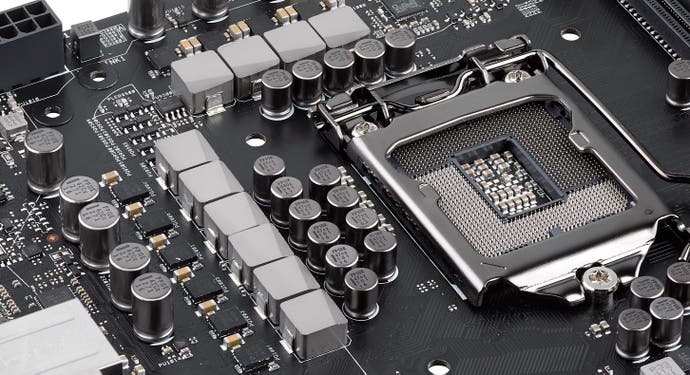Coffee Lake: the most exciting Intel CPU launch in years?
The leaks are remarkable: six-core i5s and i7s with a big price-cut on quad-core chips.
After years of iterative upgrades, things are starting to become interesting again in the CPU space on PC. We've already seen Ryzen 7's disruptive influence on Intel's enthusiast line and how Ryzen 5 strikes at Chipzilla's Core i5 gaming heartland. Things are changing and Intel is set to respond with the imminent launch of its new Coffee Lake line of processors. So what should we expect? Well, how does a full six-core processor for i5 money sound? Or how about today's i5 performance at i3 prices? That's what a series of convincing leaks over the last few weeks and months have promised - and more.
It's a shake-up to Intel's mainstream CPU line that we've not seen since the arrival of its Sandy Bridge processors way back in 2011 with its almost legendary Core i5 2500K and i7 2600K, chips that still form the basis of many gaming PCs today. The company set the template for years of products to follow back then: its newest architectural innovations come to the mainstream market first, with three distinct pieces of silicon - a quad-core processor that services the i5 and i7 lines, offering four and eight threads respectively (an i5 is literally a cut-down i7) along with a dual-core, quad-thread i3, which in turn gets pared back for lower-end Pentiums and the vast bulk of its laptop and ultrabook CPUs.
The leaks for Coffee Leak are fascinating. First of all, the dual-core silicon - although certainly in production - doesn't seem to make it to the i3 line this time. Instead, Intel's more budget-orientated processors use the quad-core die instead. The i3 8400 locks all cores to 3.6GHz, disables hyper-threading and turbo clocks and should prove just as capable as today's locked i5 quad (that is, perfectly serviceable for 60fps on the majority of titles). For those looking to overclock, an i3 8350K is set to launch with a 4.0GHz clock, an unlocked multiplier and more L3 cache. Based on the current Kaby Lake, which uses the same production process, overclocks to 4.8GHz with adequate cooling should be possible.
Meanwhile, a new six-core processor design dominates the i5 and i7 line - and this looks like the most exciting aspect of the Coffee Lake leaks. In our recent Skylake-X review, we found that Intel's latest many-core processors - including the six-core i7 7800X - offered prodigious power, albeit with a revamp to core-to-core connectivity that causes a performance downgrade on many games. The evidence from the leaked specs suggests that Intel's approach with the six-core/12-thread Core i7 8700K is to build upon the existing 7700K design, as opposed to migrating Skylake-X across to the new platform. The leaked spec shows that the 8700K ships with 12MB of L3 cache, as opposed to the meagre 8.25MB of the 7800X - suggesting an extension of the existing design rather than another repurposing of Intel's server technology.
In terms of what that means for gameplay though, prior results in six to eight core comparisons have only seen relatively small jumps overall - even in the most demanding multi-core aware games. The processor we'll be looking at very closely is the new i5, which retains the six-core design, but disables hyper-threading. At the very least we'd hope to see performance on par with today's i7s but in practise, we may get results even better than that.
Coffee Lake's arrival will clearly have implications for AMD's Ryzen line. In our Ryzen 5 review, we noted that the base 1600 was the best buy, and further testing has only confirmed that. We found that the delta between Ryzen 5 1600 and an overclocked Ryzen 7 - essentially, the very best that the AM4 platform offers right now - varies from around nine per cent of additional performance to a maximum of 13 per cent. In the here and now, Ryzen 5 1600 is cheaper than Core i5 and demonstrably more powerful with modern gaming engines. However, assuming the leaks pan out, Ryzen 5 would beat the new Coffee Lake i3, but may struggle against the new i5. There'd certainly be a higher top-end too by investing in an Intel platform, as Core i7 7700K already outperforms Ryzen 7 handily, and we'd expect the difference to widen with the arrival of the 8700K. Getting the price right will be key for Intel here

| Core i7 8700K | Core i7 8700 | Core i5 8600K | Core i5 8400 | Core i3 8350K | Core i3 8300K | |
|---|---|---|---|---|---|---|
| Cores/Threads | 6/12 | 6/12 | 6/6 | 6/6 | 4/4 | 4/4 |
| Base Clocks | 3.7GHz | 3.2GHz | 3.6GHz | 2.8GHz | 4.0GHz | 3.6GHz |
| Boost Clocks | 4.3GHz | 4.3GHz | 4.1GHz | 3.8GHz | - | - |
| Cache | 12MB | 12MB | 9MB | 9MB | 8MB | 6MB |
What is curious is that there's been no word of any repurposing of the current Core i7 spec - four threads, eight cores - for the eighth-gen desktop release. However, the architecture clearly isn't going anywhere. Early looks at Coffee Lake-based Acer laptops have revealed 15W quad-core i7 processors with the full eight-thread complement. The i7 8550U only has a base clock of 1.8GHz but should turbo to 3GHz and beyond depending on the load - so Coffee Lake looks set to offer more in other markets too. Quad-core processing coming to ultrabooks is a big deal, and Intel is already promising 30 per cent performance bumps here in the eighth-gen line.
Intel is planning to confirm the full details of the eighth-gen Core line on August 21st, and it'll be interesting to see what the company can add to the vast array of leaks we've seen over the last few weeks, but what we know already represents the biggest shake-up to Intel's mainstream desktop line in six years. More cores, more power - but beyond that, the real question is the extent to which gaming really needs extra CPU resources. Buy a 7700K, plant it in a Z270 board and you have the best quad-core processor Intel has, overclocked out of the box to 4.5GHz via the now-standard enhanced turbo feature on Z-class motherboards. It's already a surfeit of power for gaming alone.
To address that, we have three answers: firstly, if more power becomes the norm on the mainstream boards, the more likely developers are to use it. Secondly, when the next-gen Xbox and PlayStation consoles arrive, they'll almost certainly be using Ryzen cores - a true generational leap from what we have now, and games should be considerably more CPU-heavy. And at that point, more power will be very handy. And finally, if you don't need that level of performance, the new i3 should be keenly priced and perform beautifully on most titles, lowering the cost of a decent 1080p60 gaming PC.
It's not all plain sailing though - despite sharing the same physical socket as the current range of Intel motherboards, manufacturer Asrock has already confirmed that the new CPUs won't be compatible with existing boards, meaning that existing users of recent Intel processors will need to buy a new board. But for those looking to upgrade, we finally have a really good reason for doing so - a significantly larger, more capable, more future-proof processor.


